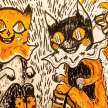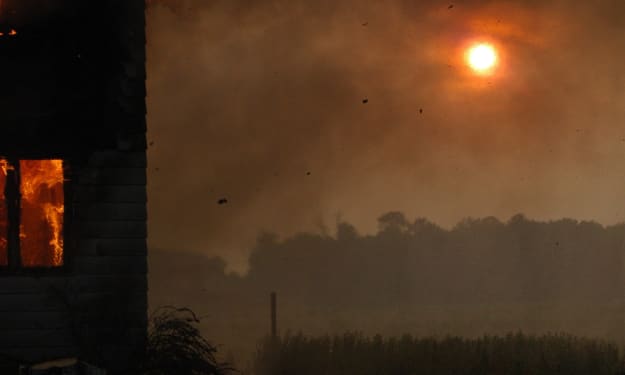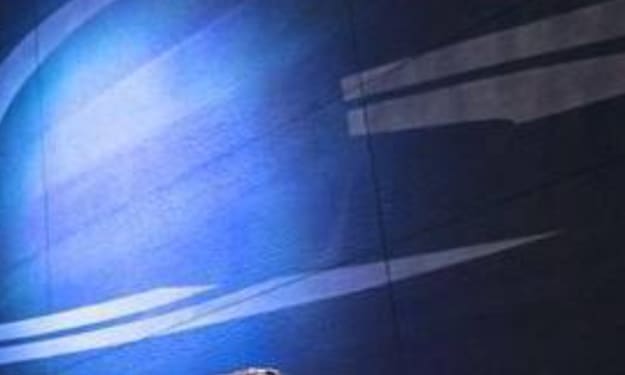
They cannot know but they do. Galloway did all he could: there is nothing heavier than a secret kept from humankind.
When they knew they knew, Galloway preached instruction on acute mental exercises, like a monk explaining god. The lesson was on how to build a prison for a secret in your head. You open a wall in the weakest point of brick. Pry the pieces loose with soft fingertips if you’ve never fortified your personhood with hammers and picks. Now, you are the sharp object. It’s important that you are the sharpest thing in your own room. If that’s not possible, if your mind is too much flesh, wall yourself in. Like he said, it’s important.
----------
On a damp night, Escobar hastened through the misty rainbows leaking beneath the car park. The overhead fluorescence cast a rheumatoid halo around his head. He gripped a dark briefcase actively defying the physicality of rain: shards of wet light bounced in greasy diamonds against its shape, yet never sunk into the leather tooth.
Escobar imagined the dryness of the briefcase like he imagined his own bone: so inescapably bound to blood it could never truly be called wet. His skeleton, a museum too dark to name.
“Il dort. Quoique le sort fut pour lui bien étrange,
Il vivait. Il mourut quand il n’eut plus son ange.”
He muttered as he passed through the cave of exhaust and time trapped in meters. In moments when the mantra lapsed and he couldn’t block his consciousness from mortal participation, he glanced anxiously at the clots of nothing beyond the street lamps, and all that nothingness suggested.
“La choise simplement d’elle-même arriva.
Comme la nuit se fait lorsque le jour s’en va.”
He slinks into the alley between Xingling’s neon cutouts of steaming rice and a bar for old men too tired to replace the wooden “Sissy’s Tavern” sign stolen when they were young. He stops at a pockmarked green metal door with a winking anime angel poster clinging by adhesive threads. His friend used to sell ecstasy out of the conspicuously homemade doggy entrance cut at the bottom, now a business lobby for rats.
Three slow, almost sluggish knocks, imitating a sleepwalking caller. Escobar has felt he will never wake up for several months now. The briefcase burns against his sweating palm.
He jumps when the lock squeals impatiently despite the hesitancy with which Xiao pulls it back, and the two men split a look that can only be described as cosmic helplessness. There’s no way he hasn’t been followed, there’s nothing he could have done to prevent this, and there’s nothing for it but to hand the bone dry case to his friend and shudder with the weight of its absence.
----------
As Xiao takes the briefcase, his knees almost buckle. Galloway is chewing his lip at the card table behind him, lost in wherever he goes, yet the instinct to curb signs of weakness persists even at this final hour, when there is no point in pretense.
Back when Galloway told them how the human brain was prey, how parapsychology fueled their government’s keenest interests, Xiao did not believe. He allowed them to use his illicit workspace as a hideout for whatever sordid affair he assumed Escobar had brought upon himself. What a man as peculiar as Galloway could be smuggling, he didn’t want to know. The girl that worked with them wasn’t chatty, and while she didn’t frown the lines around her eyes were sad, and it made Xiao uneasy. He didn’t want to know whose grave they were digging, but he did want to know it wasn’t Escobar’s own, so he eyed their gatherings suspiciously from the rafters like a discomfited owl.
Then he awoke one balmy afternoon with an inexplicably sizzling briefcase in hand, in a city he didn’t recognize, wearing shoes he didn’t own, staring blankly and blindly into an unfamiliar sunset doubly foreign without his glasses. He was walking towards a radio satellite, two states over.
Liney was grabbing his elbow a little wild-eyed, GPS open on her phone, ponytail hastily half-done and car stopped in the middle of a quiet highway. He remembered not quite hearing her over the steam rising from the asphalt, somehow too loud, his arm still glued to the case’s leather handle, aching and hot.
This event changed things. He knew he could not escape their ring of fire, was no longer their idle landlord, and Galloway informed him they had something to protect: from the mind of the world, in the world; or even in their own minds.
For Escobar, it was literature. For Xiao, it was Escher. Tessellated castles, endless angles and dimensions of checkers, patterns like blueprints like skyscrapers, holding him cloud-bound, unreachable. If the briefcase was smothering, if the urge to suddenly take it and wander in a direction he’s never considered before strikes, he imagines Escher’s fortress rising monumental in his mind.
He doesn’t know about Liney or Galloway, how they aren’t vacantly spellstruck by the briefcase or whatever’s inside. His time to piece it together has run out, their location mapped. The jaws beginning to close. He knows Escobar is afraid of the briefcase, and Galloway is afraid for it, but Xiao is afraid for his friends and especially now for Liney, who gently eases the briefcase out of his grip. He thinks of last night how he couldn’t see her face atop the staircase as Galloway handed her an orange bottle of sleeping pills.
He wants to catch Liney by the sleeve of her pale blue shirt like snatching a dandelion seed from the wind. He wants to smooth the wild hair from her cheekbones and say wait, wait, wait for me. But they are two substances that can never truly touch, and they can’t go together.
----------
Galloway, his eyes dark and burning. “You know where to go,” he said. And she did.
First, she goes home. The city looms starless as she leans against the fire escape railing and watches the pot and Starburst in her breath curl into the formless night. It’s imperative she isn’t too hasty, doesn’t give anything away.
She doesn’t know if Escobar made it, and she can’t text Xiao a series of dumb emojis or his horoscope. Galloway said she would know when the time was right to leave, and she spends three days soaking in the sunspots of her kitchen, drinking tea, testing ink pens. A notification chimes across the wallpaper of her iphone – a Bosch painting read as wildflowers from a distance – declaring a transfer of funds in the amount of $20,000.00 sent to account X ending in ****, above a nude woman tasting fruit so sweet it looks like it hurts.
She figures $20,000 is a pretty clear sign.
They mapped the route out months ago, when it became clear the book, as long as it existed, would be found.
Liney purchased several last minute plane tickets, destinations spread out in dizzying constellations that reminded her of Xiao’s meditation and she smiled at the memory of Escobar’s choppy French at the rest stop in Lyon. The route is deliberately frantic, she hopes they think she’s panicking, backed into a corner despite how wide and wild the world. She doesn’t practice any mental exercises or envision jenga stacks of unending quadrilaterals. She wants them to find her, to follow her, to see the book and how it ends.
At her last stop, she rents a car and drives out to a little house in the English countryside. In the back of the trunk, four plastic bottles of gasoline slide and rattle at every stony bump back to her storybook home.
----------
She’s been practicing the matchstick. Galloway said, it doesn’t matter the accuracy. It does matter the intent. She needs to prove she is the artist, or the book won’t follow her. When their enemies arrive, bloodhounded, the book’s ash will speak all the volumes of power they imagined themselves entirely out of existence.
Purposefully, she pulls the pen against the paper blacker than any space she can imagine and draws the tiny, delicate stick, focuses and draws the potassium chlorate, the sulfur, the glass powder, its essence. The tiny match rolls out from between the binding on the last stroke, perfect.
What universe bends to an ungrateful hand? That was the problem: atoms will go where they will, space will bend as it can, and it doesn’t matter to the substance that makes them all how the story goes and to whom it goes and to where it goes. They just go. She fleetingly thinks of her mother’s knitting. The way the yarn obeyed the whim of small design. How she wasn’t very good at it. How the thread moved anyway.
She has the tinder box. The matchstick was all she needed, a token of pure thought and energy connecting Liney’s consciousness to the black book with black pages. Her perfect match strikes the box and she tosses the lit end into a room slick with promise and closes the door. She needs just a bit of time.
Liney fishes the pill from the prescription bottle, a tiny pearl. Swallows it and lays down on the familiar carpet as the walls begin to shine and roar gold.
Her mother silhouetted in a rocking chair knitting something hideous. The cat warming by the fireplace. The smell of lumber crackling, becoming new. She a little girl, dozing off. She tall and proud, bowing to sleep.
Liney knows she’s dreaming when the cat rises from the fireplace and picks a path down the hall. She follows these old steps and almost pauses at her childhood bedroom. The familiar pink curtains glow in her peripheral vision. She knows Jamie will be there in socks and pajamas and a popsicle grin. The compulsion to look is so strong she trembles with the force of it, a memory with dangerous gravity. Down the hall, three slow knocks bellow and echo. She keeps walking.
“I don’t have much time,” she tells the cat. It looks at her with eyes like two moons. “You do,” it responds.
At the end of the hall is a green door, peeling and graffitied. A cartoon angel winks slyly from a faded poster. She turns the handle, and it doesn’t shriek.
Beyond are waves of grass, a dirt road, a bus stop. It’s the route she takes her second semester of university, the surreal journey from her pastoral hometown to the bright city. If she catches the 10:15 bus, she won’t be late for Prof. Galloway’s Life and Death in the Creative Unconscious Art II class, for which she made the deadline by only a hair. Unlike in her true memory, the cat is here, inky fur so dark it seems cartoonish. It paws at a patch of purple weeds beneath the bus stop bench, and she joins it in digging until the work is done and it is time to go.
----------
Three weeks later, a man takes a flight to the English countryside. He boards a bus to a deserted stop the driver almost circumvents, so unused to a passenger disembarking at that lonely bench. As the bus pulls away, he kneels in the dirt and removes a gardening spade from his coat pocket. He pauses a moment to admire the gentle swells of purple flowers dozing in the shade of the bench before sinking his tool into the earth, patiently, until he reaches the metal-hot cover of a black, black book.
Brushing the dirt from his knees, he carefully turns the book over in his hands a few times, as if a blind man reacquainted with a loved face. He brought a briefcase but the accessory is mostly show; he is the artist, and the book is comfortable against his lifeline.
The man, satisfied, sits on the bench and begins to draw: a girl who isn’t frowning, but the lines around her eyes are sad.






Comments
There are no comments for this story
Be the first to respond and start the conversation.